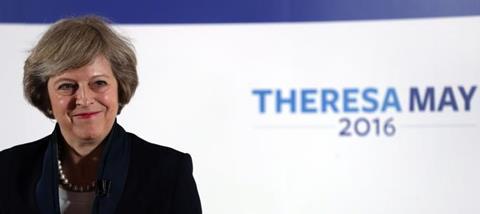
Theresa May has been described by many as a ‘no-nonsense’ woman. Although she’s said to regularly attend church, Ms May has also chosen to be fairly quiet about her faith. ‘I like to keep my personal life personal,’ she says. In an age where Christian politicians are often heavily scrutinised and even ridiculed for their religious opinions, Theresa May’s quiet approach could well be wise.
Still, every now and then, Ms May has hinted at her Christian beliefs. When she appeared on BBC Radio 4’s Desert Island discs in 2014, she chose Isaac Watt’s hymn ‘When I survey the wondrous cross’ as one of her songs. But even that appearance (on a show where guests often talk about their personal lives) didn’t reveal much, as the Guardian noted, ‘getting a glimpse behind her politician’s facade is no easy feat.’

Despite the below list, some Christians may be sceptical of Ms May’s faith. The fact she voted in favour of same sex marriage will upset some, as will her statement that British people ‘benefit greatly’ from the guidance offered by Sharia law. On a purely political level, Ms May campaigned to remain in the EU, so some will wonder if she’s best placed to negotiate Brexit.
Although our next Prime Minister appears reluctant to talk in detail about her personal life (including her religious views), she does admit her Christian faith ‘helps to frame’ her ‘thinking and approach’. With this in mind, here’s three ways Ms May’s private Christian faith has likely influenced her public politics:
1. Her reasons for entering public service
When announcing her decision to run for leader of the Conservative party less than two weeks ago, she suggested that being the daughter of a vicar had prepared her for a life in politics:
‘I know some politicians seek high office because they are driven by ideological fervour. I know others seek it for reasons of ambition or glory. My reasons are much simpler. I grew up the daughter of a local vicar and the granddaughter of a regimental sergeant major. Public service has been a part of who I am for as long as I can remember.’
2. Her refusal to gossip
Theresa May has said her Christian faith ‘is part of me. It is part of who I am and therefore how I approach things’. While bad-mouthing colleagues and seeking media attention is a normal part of political life for some, Theresa May takes a different approach:
‘I know I’m not a showy politician, I don’t tour the TV studios, I don’t gossip about people over lunch, I don’t go drinking in Parliament’s bars.’
3. Her stance on social issues
Having consistently voted for a reduction in the abortion limit, it seems Ms May is generally pro-life. In 2015 she also voted against the introduction of assisted suicide. And in the speech where she announced her desire to be Prime Minister she raised the issue of social equality:
‘If you’re born poor, you will die on average nine years earlier than others. If you’re black you will be treated much more harshly by the criminal justice system than if you’re white. If you’re a white working class boy, you’re less likely than anybody else to go to university. If you’re at a state school, you’re less likely to reach the top professions than if you’re educated privately. If you’re a woman you still earn less than a man. If you suffer from mental health problems, there’s too often not enough help to hand. If you’re young, you’ll find it harder than ever to own your own home.
‘These are all burning injustices and as I did with the misuse of stop and search, and deaths in police custody, and modern slavery, I am determined to fight against them…We, the Conservatives will put ourselves at the service of normal working people. We will strive to make Britain a country that works for everyone, regardless of who they are and where they’re from.’
























